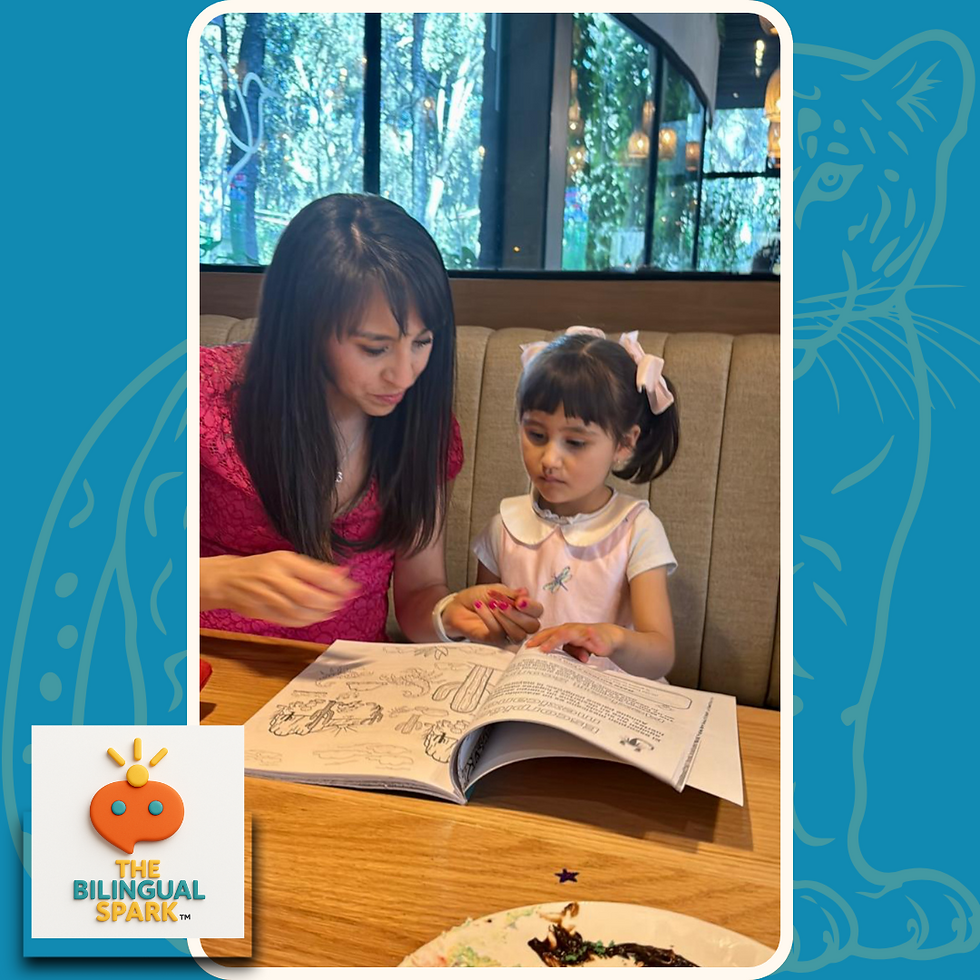How Spanish Audios Help Kids Learn — Even on Busy Days
- Edgar Serrano
- May 4
- 2 min read
Updated: May 5
By Edgar Serrano, Founder of The Bilingual Spark™
The Spark Behind the Story
Imagine this: a child in the backseat during a car ride, flipping through a bilingual book. Her eyes light up as she hears "ajolote" pronounced with clarity and warmth. She repeats it, then again. No flashcards. No screen. Just a voice, a book, and the power of connection.
This is the magic of multisensory learning—and the spark behind Animales de México and its native Spanish audio companion.

Why Audio Matters More Than Ever
In today’s fast-paced world, parents and teachers seek educational tools that seamlessly integrate into daily routines. Research supports this approach:
Multisensory Learning: Dr. Tracey Tokuhama-Espinosa, author of The Multilingual Mind, emphasizes that engaging multiple senses—listening, seeing, and doing—enhances memory formation and long-term understanding.
Comprehensible Input: Dr. Stephen Krashen's theory highlights that children acquire language most effectively when exposed to meaningful input they can understand in context—without stress or pressure.
Native audios provide this accessible, relaxed exposure to authentic Spanish.
Real Life. Real Language Moments.
Whether you're in a classroom or kitchen, Spanish audio allows learning to happen without adding more to your plate. Parents are already noticing how easily these tools blend into daily life:

“Perfect for car rides. My daughter tries to say the words before the narrator finishes. We’ve even started bringing the book to restaurants—it keeps her engaged and learning while we enjoy a meal.”
— Bilingual parent, Mexico City
“This isn’t just a coloring book. It’s a tool that makes hearts smile and minds grow.”
— From a recent social post
These aren’t rehearsed testimonials. They’re authentic sparks of joy and growth—and more are on the way.
The Science of Sound + Story
Listening comprehension is a critical building block of early literacy. Hearing language, especially in meaningful and engaging ways, strengthens a child’s ability to decode, remember, and apply what they learn.

Research by Shams & Seitz (2008) found that multisensory learning—combining auditory and visual input—activates more neural pathways than single-mode learning. Children learn faster and retain more when they hear and see language simultaneously, especially when paired with positive emotion.
Dr. Tokuhama-Espinosa reminds us that “emotion drives attention, and attention drives learning.”
Why This Matters for Busy Families and Educators
You don’t need a full lesson plan or a tech setup to support Spanish learning. You just need:
🎧 A native speaker in their ear
📚 A beautiful book in their hands
⏳ A few everyday moments
Animales de México was created to bring language and culture to life—anytime, anywhere.
“We looked and looked for resources that parents and children could use together… but the quality was poor. This is going to be a wonderful assist to families wanting to explore bilingual and bicultural options.”
— Beth, Former PBS Education Director
Ready to Try It?
Get your free audio companion, pronunciation guide, and mini-journal at:
.png)



Comments